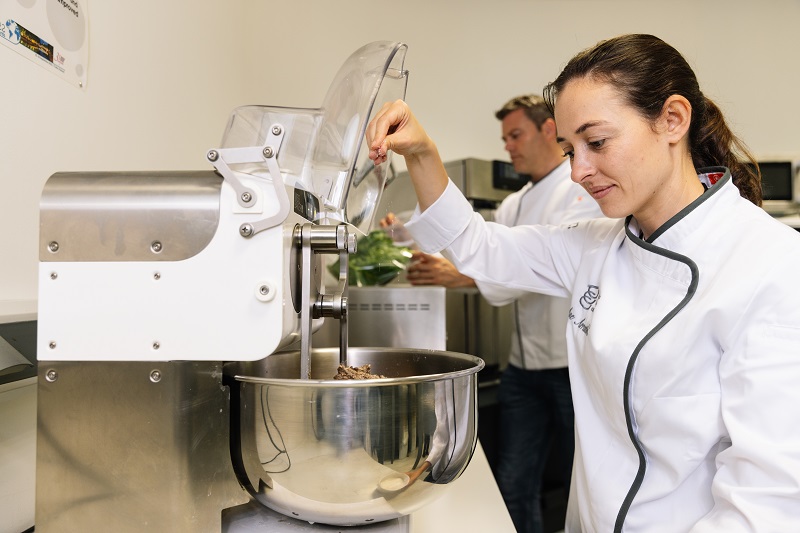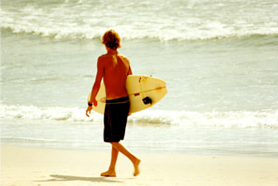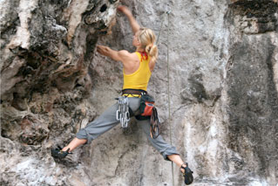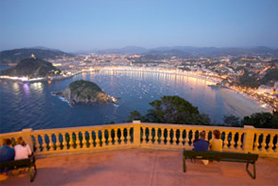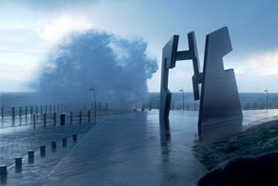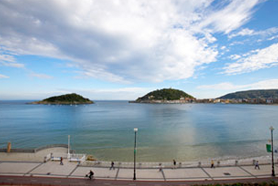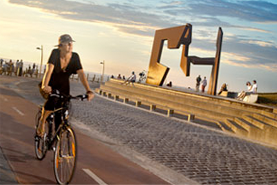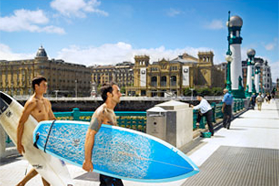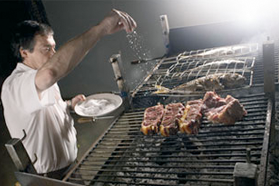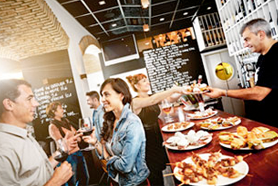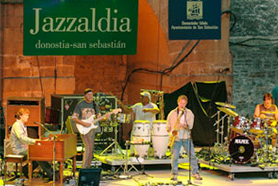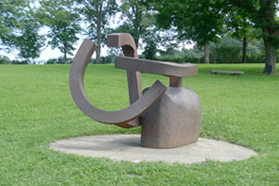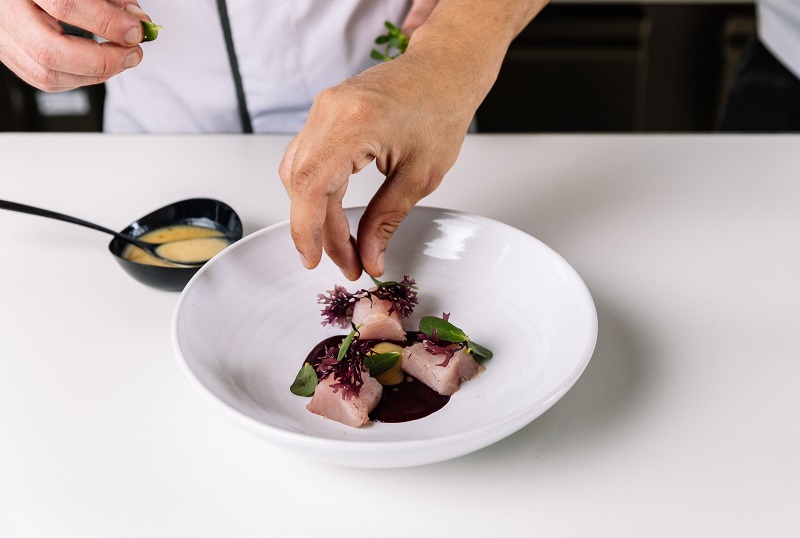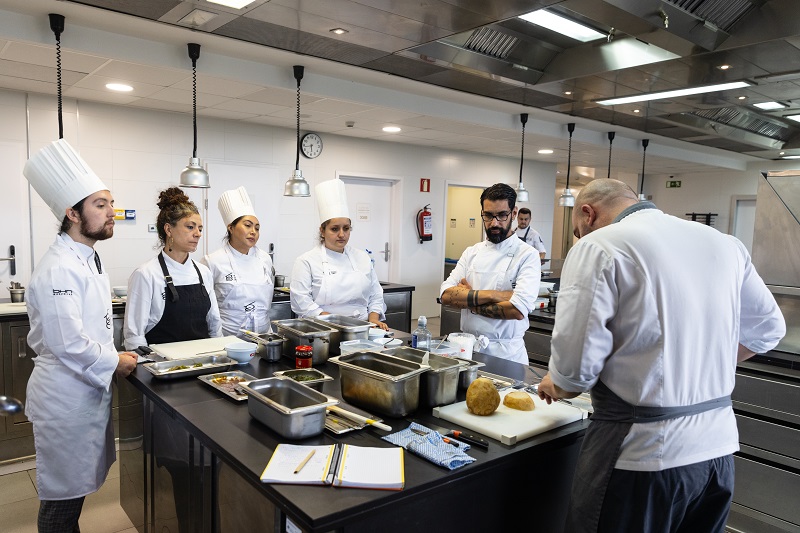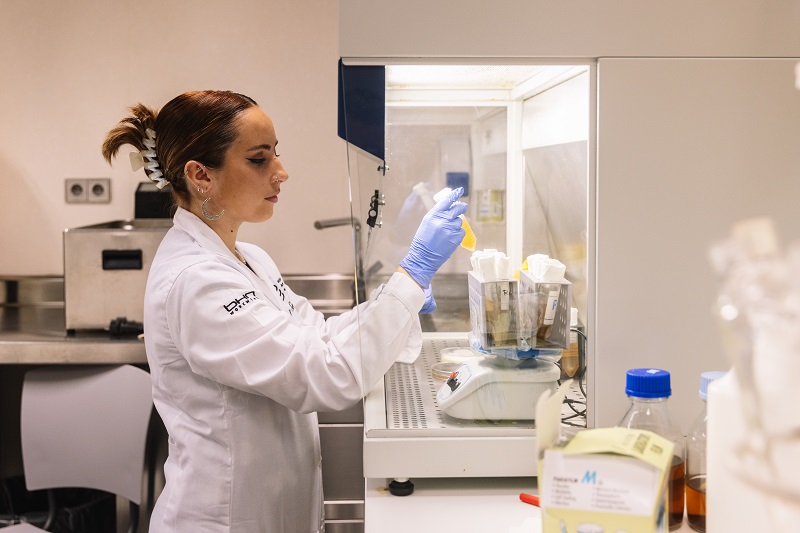Explore the origin of sweet and master its intricacies.
At the tip of one's tongue, sweetness is recognized. To truly understand it, one must decode its sugary secrets. In the program, students specialize in restaurant pastry, mastering the basics of formulation. They perfect essential and cutting-edge sweet kitchen techniques guided by industry experts. Throughout the program, students immerse themselves in the captivating world of desserts. They gain the skills and knowledge to excel in gastronomic pastry. From precise recipe formulation to creating artistic desserts, they become professionals in restaurant pastry.
Practical information
Start Date: october 2024.
Number of credits: 60 ECTS
Campus Based Learning
Duration: 9 months in total
6 months of campus based training (October 2024 to March 2025)
3 months of external internships
Schedule:
Monday to Friday from 15:30 to 20:30h (CEST)
18 Spots Available
Master's degree awarded by MONDRAGON UNIBERTSITATEA and offered by the Faculty of Gastronomic Sciences at Basque Culinary Center
For inquiries and more information, contact cursos@bculinary.com
Master'S Objectives
Enhance and advance essential knowledge of traditional pastry techniques, as well as master the application of cutting-edge cooking.
Gain in-depth knowledge of raw materials and their derivatives, including their gastronomic properties, pairings, and the incorporation of new ingredients applicable in sweet preparations, such as spices, herbs, flowers, and other elements.
Acquire a solid foundation in formulation and understand how ingredients interact with techniques, applying creative and innovative processes to address new culinary proposals in restaurant pastry and sweet cuisine.
Create a unique menu of sweet preparations, allowing you to meet the demands of contemporary cuisine and offer distinctive and enticing choices to diners.
Career Opportunities
We understand that professional opportunities may vary based on geographic location and individual preferences. However, with this program, participants can pursue roles and positions in the following areas:
Head of the pastry section in restaurants and hotels.
Trainer or instructor in educational centers.
Pastry chef in a bakery or pastry workshop.
Head of a bakery or pastry workshop.
Research chef for sweet food industry brands.
Entrepreneur in businesses related to bakery, pastry, and ice cream.
Listen to our students
10+1 Reasons
Reasons why you should do this master’s degree
1
You will specialize in restaurant pastry and sweet cuisine, gaining the ability to apply cutting-edge culinary techniques.
2
You will acquire a broad, inclusive and contemporary knowledge based on the physicochemical processes of each technique, empowering you to create coherent and innovative proposals.
3
You will gain in-depth knowledge of the primary raw materials used in pastry and develop your sensory skills.
4
You will be trained by experts in pastry and sweet cuisine, receiving masterclasses from a selection of internationally esteemed professionals.
5
You will enjoy an advanced educational methodology and model, allowing you to continue your learning experience in any context.
6
You will continue your learning with a visit to France, the gastronomic birthplace of pastry.
7
You will participate in the program of additional activities organized by the Faculty, including lectures, exhibitions, and specialized conferences.
8
You will have the opportunity to undertake internships in dessert sections of esteemed restaurants or in the workshops of renowned pastry chefs.
9
You will have access to cutting-edge facilities adapted to provide a transformative, innovative, and safe learning experience.
10
You will become part of Basque Culinary Center, a pioneering academic institution with international recognition and the support of the world's most influential chefs.
Directed to
The Master's program is designed for individuals with the following profiles:
Professionals in the field with experience in pastry shops, workshops, cold sections, and related areas, who aim to innovate and enrich their pastry and dessert offerings, taking their skills and knowledge to the next level.
Cooks with experience in savory cuisine who wish to broaden their culinary horizons and delve into the exciting world of sweet cuisine, exploring new techniques and trends.
Entrepreneurial professionals seeking to specialize in restaurant pastry and expand their repertoire of sweet preparations with the goal of offering exceptional culinary experiences to their customers.
Previous work experience is highly regarded, and having at least one year of experience in the industry is recommended.
If you don't see your profile reflected in the above points but are interested in the Master's program, don't hesitate to apply. We will assess your education and experience and get in touch with you.
Programme
The Master's Degree study programme gives students overall competencies, supplemented with a period of work placement during which the final project is prepared.
Module 1: The Cook and the Current Culinary Context (5 ECTS)
- Sensory Analysis
- Culinary Chemistry
- Sustainability Food
- Quality and Safety
- Dining Room and Service
- Restaurant Management Personal Skills
Module 2: Traditional and Modern Pastry (6 ECTS)
- Raw Materials: Eggs, Dairy, Sugar, Flours...
- Basic Creams and Fillings
- Sponge Cakes Mousses and Derivatives
- Glazes
Module 3: The Sweet World in the Restaurant (10.5 ECTS)
- Ice Creams and Sorbets
- Restaurant Desserts:
- The Concept
- Flavor
- Balance
- Textures
- Petit Fours:
- After a Dessert Different Presentations.
- The Setting
- Spices, Herbs, and Flowers in the Sweet World
- Contemporary Techniques:
- Foams: Fat-Based, Gelatin-Based, Starch-Based, Albumin-Based, Hot and Cold.
- Airs: Dairy-Based, Fruit-Based, Lecithin, Sucrose Esters, or Gels: Basic Gelling Agents, Gelatin, Kappa, Agar-Agar, Iota.
- Thickeners: Modified Starches, Native Starches, Gums, Algae, or The New Machinery in the Restaurant
- Fermentation Technique Updated as New Gastronomic Trends:
- Lactic
- Alcoholic Fungi: Koji, Penicillium
- Scoby: Kombucha
- Other Products: Wafer Paper, Liquid Nitrogen, Dry Ice, Quicklime...
- Pairings in the Sweet World
- The Vegetable Garden as a Creative Model
- Creativity and Innovation in Restaurant Desserts:
- The Evolution Process
- Starting Points and the Dessert's Thread
- From Thought to Plate
- New Trends
- Decontextualization of Ingredients
Module 4: Chocolate (3 ECTS)
- From Cocoa Bean to Chocolate
- Chocolate Tempering Chocolates, Truffles, and Ganaches
- Chocolate as a Unique Element in a Dessert
- Bean to Bar
Module 5: Formulation (6.5 ECTS)
- The Concept and Principles of Formulation
- Ganache Formulation
- Ice Cream and Sorbet Formulation
- Sponge Cake Formulation Mousse Formulation
Module 6: Bakery (2 ECTS)
- Flour, Seeds and Grains, Yeasts, and Seasonings. Water and Fats
- Traditional Doughs: Shortcrust, Boiled, Puff Pastry
- Preferments
- Fermentation Techniques
Master's thesis
Design, Development, and Execution of a Unique Sweet Gastronomic Concept.
Program outline
Upon completing the academic period, there will be a 3-month internship to put what has been learned into practice and gain further knowledge. These internships will take place in renowned establishments nationally and internationally:
Restaurants known for restaurant desserts Pastry shops and bakeries Catering companies R&D Units of the food industry or other businesses where students can apply their skills. The management of internships is a personalized process in which, with the guidance of the master's coordination and tutoring, students select the internship placement.
Calendar
Total Duration: 9 months
Number of Credits: 60 ECTS
Academic Period: october 2024 to march 2025
Schedule: monday to friday from 3:30 PM to 8:30 PM (CEST)
Curricular Internships: april to july 2025
Methodology
The Master's program is delivered using the "learning by doing" methodology, which is based on the concept that the best way to learn is through practical experience and direct action. Instead of solely focusing on theory and passive instruction, this methodology promotes students gaining knowledge and skills by actively participating in practical activities and real projects.
The learning process encompasses the following elements:
Demonstrative explanations of the application of each technique, accompanied by insights from a food technology expert, helping students understand the underlying principles of applying each technique.
Learning sessions: these sessions cover the theoretical concepts of each module within the program.
Raw ingredient tastings and sensory analysis classes, supporting the development of the students' tasting abilities.
Practical workshops for each technique and creativity sessions for the development of restaurant desserts. The importance of concept and the consistent thread in creating a dessert menu will be emphasized.
Seminars and masterclasses with renowned chefs and pastry chefs specializing in restaurant dessert creation and pastry.
Learning journeys: the Master's program includes a 2-3 day visit to a renowned destination in the world of sweets. In previous editions, visits to destinations like Paris, Lyon, or Barcelona have been conducted. These activities outside the classroom may include visits to sweet industry production centers, pastry shops, and representative workshops at the destination.
Master's Final Project: students will work on designing their Master's Final Project, developing creations that will be defended and evaluated by an external panel. One of the exercises in this project will involve designing and offering a sweet menu comprising snacks, plated desserts, petit fours, or a box of chocolates.
Curricular Internships: curricular internships with companies are conducted after the completion of in-person classes and the Master's Final Project. The internship management is a personalized process, with the guidance and supervision of the Master's program coordinators. Students have the opportunity to choose internship placements where they can apply their knowledge for a duration of 3 months in establishments such as:
Restaurants known for their restaurant desserts
Pastry shops and workshops
Catering companies
R&D units in the food industry or other businesses where students can utilize their skills.
*Students have the option to validate internships based on their professional experience.
Teachers and guests
Learn from Accomplished Industry Experts!
You will have the opportunity to learn from accomplished professionals in the field, recognized for their academic, intellectual, social influence, and impactful contributions.The program boasts a faculty panel composed of seasoned culinary experts with specialized knowledge in the realm of sweet Gastronomy.
Master's coordinator
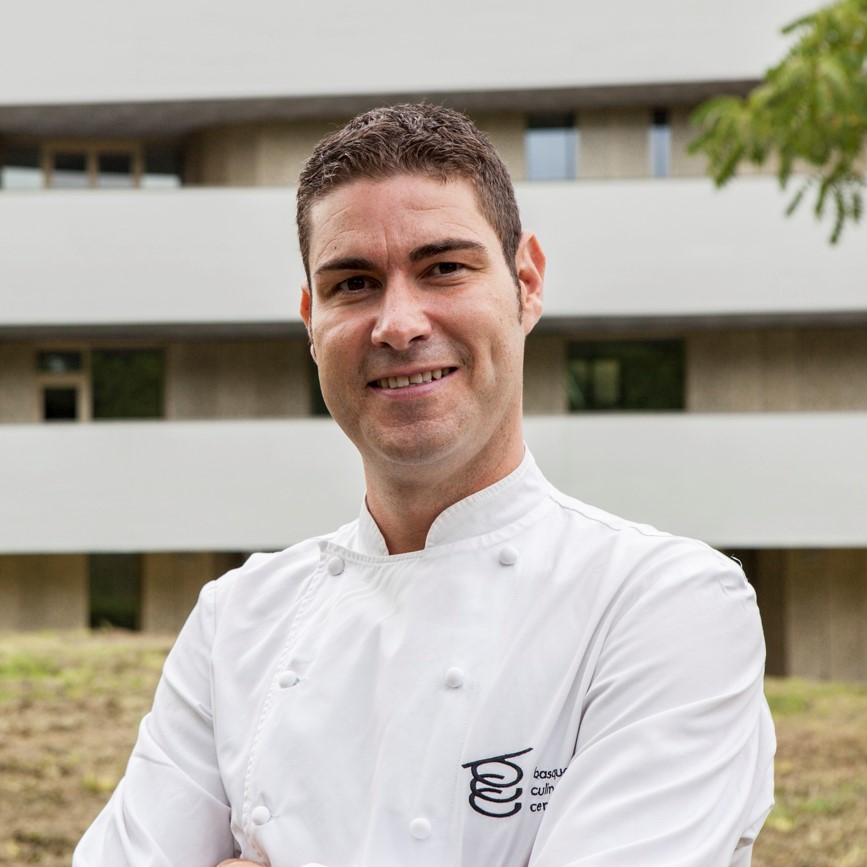
Luis Arrufat
Master's coordinator
Luis not only serves as the Master Coordinator Chef for our program but also imparts his profound knowledge as a professor in Restaurant Pastry and Sweet Cuisine. He held the prestigious position of Head Pastry Chef at the iconic El Bulli Restaurant during its final year, an establishment that represented the pinnacle of gastronomy. His talent and dedication also led him to become an integral part of Ferrán Adriá's culinary team for a remarkable six years. But Luis 's impact extends far beyond El Bulli. He has taken on roles of great responsibility in the world of culinary innovation. From Arzak, where avant-garde meets tradition, to the José Andrés Restaurant chain in Washington DC, a realm of culinary diversity and creativity. His contribution to research and development in these establishments has left an indelible mark.
In the present day, Luis serves as a culinary sage and advisor to several nationally renowned restaurants. His wealth of knowledge and passion for the art of cooking continue to inspire and shape the culinary landscape, making him the perfect guide for those embarking on their own culinary journeys.
Professors
Profesora titular
Empezó su trayectoria gastronómica en Dublín. Creció como jefa de sala en restaurantes de gran nombre y se formó en la WSET de Londres como Sommelier profesional. Tras cinco años regresa a su tierra natal Barcelona, donde su pasión por la pastelería le lleva a la Escuela de Hostelería Hofmann. Integró parte del equipo de formadores de la escuela y del equipo de producción de la pastelería.
Cristina lleva tres años en Basque Culinary Center como profesora y tutora en el Máster de Pastelería de restaurante y Cocina dulce, enseñando la parte más esencial, creativa e innovadora de la pastelería.
Profesor titular
Experto en procesos de creación y formulación de todo tipo de elaboraciones dulces. Además de tener una alta trayectoria como profesional pastelero y formador en pastelería, es un apasionado y curioso de la cocina dulce.
En los últimos años se ha centrado en realizar trabajos de asesoramiento y demostraciones culinarias para firmas comerciales en todo el mundo. Colabora como profesor asociado en programas formativos del mundo dulce de Basque Culinary Center.
Additionally, you will benefit from the expertise of other faculty members from the Faculty, including:
Maria Mora from BCC Innovation: Sensory tastings
Alfredo Taboada: Fermentations
Adela Balderas: Personal skills management
Edorta Lamo: Bread
Patxi Troitiño and Koro Santos: Sweet cuisine and pairing
Iñaki Álava: Culinary chemistry
During the Master's program, master pastry chefs, restaurant chefs, and esteemed Chefs will conduct pastry and restaurant dessert masterclasses in which they will create some of their most representative creations. They will explain the application of techniques, methods of creation, as well as their vision and philosophy. Some of the past guest instructors include:
Jordi Puigvert: Seminar on "New pastry products." Author of a key book for understanding modern pastry concepts and techniques and owner of Sweet N go.
Yann Duytsche: Seminar on "Avant-garde in pastry." Author of a key book bridging the transition from pastry to dessert cuisine, Diversiones dulces, and owner of the Chocolatería Dolç in Barcelona.
Josep María Rodríguez: Seminar on "Bakery pastry." Owner of the Pastisseria Barcelona.
Oliver Fernández and José Romero: Seminar on "Pastries." Pastry professors from the Barcelona guild.
Miquel Guarro: Professor at the prestigious Chocolate Academy of Spain.
David Gil: Pastry chef for Albert Adriá in various establishments within the El Barri Adriá group.
Fees / Grants
The total cost of the Master's program is 12.375 €, which will be paid as follows:
150 € upon application (fully refundable in case of non-admission).
25% of the total, 3.056,25 € upon admission confirmation as a reservation fee.
The remaining amount is 3 installments of 3.056,25 € in October, December, and February.
The master's price includes:
Academic materials
Basque Culinary Center uniform
Access to the online learning platform
Seminars and masterclasses included in the Master
Study trips (transport to the destination, visit arrangements, and accommodation A/D)
Management of curricular internships
Issuance and delivery of the degree/diploma
Enrollment in the Basque Culinary Center alumni service: Bculinary Alumni
Admission
Basque Culinary Center has an admissions system aimed at ensuring that our students have the academic level and personal competencies necessary to successfully complete an innovative and demanding curriculum. After completing the application process, the Admissions Committee will select the admitted candidates.
-
Interested individuals must complete the online registration and upload a copy of their valid ID/NIE or passport for the registration to be validated. Regular registration will be available starting from December 2023.
-
In addition to completing the online registration, you must send the following scanned documentation to admisiones@bculinary.com:
ACADEMIC DOCUMENTATION:
STUDENTS CURRENTLY ENROLLED IN THE FINAL YEAR OF A BACHELOR'S DEGREE:
• Academic transcript showing all grades earned to date.
STUDENTS WITH PREVIOUS UNIVERSITY STUDIES COMPLETED IN SPAIN:
• Certified photocopy of the degree or certificate from the university confirming that the studies have been completed.
STUDENTS WITH PREVIOUS UNIVERSITY STUDIES COMPLETED IN A MEMBER COUNTRY OF THE EUROPEAN UNION, NORWAY, ICELAND, LIECHTENSTEIN, AND SWITZERLAND:
• SET (European Diploma Supplement) or, if not available, Certification from the home university confirming that the student is eligible to pursue Master's studies.
STUDENTS WITH PREVIOUS UNIVERSITY STUDIES COMPLETED IN A COUNTRY OUTSIDE OF THE EUROPEAN UNION, NORWAY, ICELAND, LIECHTENSTEIN, AND SWITZERLAND:
• Certification from the home university confirming that the student is eligible to pursue Master's studies. This certification must be apostilled or, in the case of countries that have not signed the Hague Convention No. 12 of October 5, 1961, legalized through consular or diplomatic channels.
LANGUAGE PROFICIENCY CERTIFICATION:
• Students whose native language is not English must provide official certification demonstrating that they have an English language proficiency level equal to or higher than B2 (Common European Framework of Reference for Languages, CEFR).
ADDITIONAL DOCUMENTATION:
In addition to the aforementioned documentation, all registrants must also submit:
• Updated CV.
• Motivation letter for enrolling in the training program.
-
A personal interview will be conducted to assess the suitability of the candidate based on their motivation and learning objectives.
-
Admitted students will be required to pay a reservation fee of €1,000.
It is important to note that:
• The application deadline will remain open until all slots are filled. The maximum number of admitted students will be 20.
• In the case of international students, the enrollment certificate required for visa processing will be provided once the reservation fee is received.
For any queries or further information, please contact admisiones@bculinary.com
Student service
Accommodation

LIVENSA LIVING SAN SEBASTIÁN, AN INNOVATIVE CONCEPT OF LODGING
Livensa Living San Sebastian is located in the neighborhood of Ibaeta, in a quiet area and a step away from Tolosa Avenue that leads to Ondarreta beach. It is an accommodation that takes care of all the details and is designed to make you feel at home during your stay in Donostia-San Sebastian. It has spaces to relax and share time in company.
Features to highlight:
- Single rooms with full kitchen and private bathroom
- Laundry
- Gym
- Common kitchens or "txokos".
- Leisure areas: living room, games room, cinema room, etc.
- Music rehearsal rooms
- Co-working spaces
- Private parking
Take advantage of the preferential rates for Basque Culinary Center students.
More information about accommodation here
Other accommodation options
Religious residences
These types of residence are small and have restricted entrance times. The rooms can be single or double and they do not always have an ensuite bathroom. Those that offer full board may not offer all the meals at weekends. Admission to these residences entails a personal interview with the families. The prices given below are approximate.
Female residences
Residencia Compañía de María
Camino de S. Bartolomé, 24. Tel 943 464795. Regimen full board Precio aproximado €625/month
Esclavas del Sagrado Corazón
Avda. Gral. Zumalakarregi, 11. Tel 943 210800. Regimen full board Precio aproximado €580-€615/month Residents must leave the residence at weekends with the exception of examination periods.
Misioneras del Sagrado Corazón
Paseo de la Fe, 34. Tel 943 456072. Regimen full board Precio aproximado €350-€490
Residencia Villa Alaidi E.A.M.
Paseo de Heriz, 95. Tel 943 210866. Regimen half board or full board Precio aproximado from €450 to €590/month No se ofrecen comidas durante el fin de semana aunque hay una cocina a disposición de las residentes.
Residencia el Carmelo Pasión
Ilumbe, 8. Tel 943 456600. Regimen full board Precio aproximado €540-€605/month
Colegio Mayor Jaizkibel
C/ Aldapeta, 49. Tel 616 369 815. Regimen Pensión completa. Precio aproximado 932€/mes. No hay cocinas disponibles para las residentes pero las estudiantes de BCC podrán realizar prácticas de cocina.
Residencia Cet Oria
Paseo de Ayete, 25. Tel 943 242400. Regimen pensión completa. Precio aproximado 370€. El precio del alojamiento y pensión se costea trabajando en el servicio de alimentación. Admisión mediante entrevista.
Camino de S. Bartolomé, 24. Tel 943 464795. Regimen full board Precio aproximado €625/month
Avda. Gral. Zumalakarregi, 11. Tel 943 210800. Regimen full board Precio aproximado €580-€615/month Residents must leave the residence at weekends with the exception of examination periods.
Paseo de la Fe, 34. Tel 943 456072. Regimen full board Precio aproximado €350-€490
Paseo de Heriz, 95. Tel 943 210866. Regimen half board or full board Precio aproximado from €450 to €590/month No se ofrecen comidas durante el fin de semana aunque hay una cocina a disposición de las residentes.
Ilumbe, 8. Tel 943 456600. Regimen full board Precio aproximado €540-€605/month
C/ Aldapeta, 49. Tel 616 369 815. Regimen Pensión completa. Precio aproximado 932€/mes. No hay cocinas disponibles para las residentes pero las estudiantes de BCC podrán realizar prácticas de cocina.
Paseo de Ayete, 25. Tel 943 242400. Regimen pensión completa. Precio aproximado 370€. El precio del alojamiento y pensión se costea trabajando en el servicio de alimentación. Admisión mediante entrevista.
Male residences
Pº Ayete, 25. Tel 943 21000. Regimen Pensión Completa. Precio aproximado 1.055€/mes.
Pº Maddalen Jauregiberri,2. Tel 943 454400. Regimen habitación y desayuno. Precio aproximado 320€-380€/mes.
Secular residences
These are mixed and are larger than the religious residences. As a general rule, they do not have entrance times.
Mixed residences
Numad Studios
Paseo de Miramón, 162. Tel (+34) 943 56 91 28. Regimen acommodation in studio with fully furnished kitchen and private bathroom Precio aproximado desde 600€ hasta 880€/mes A tan solo un paso de Basque Culinary Center. Instalaciones equipadas con un amplio espacio de cocina dedicado a prácticas culinarias, salas de estudio, gimnasio y zona lounge para socializar con otros residentes.
Colegio Mayor Olarain
Pº Ondarreta, 24. Tel 943 003300. Regimen alojamiento y desayuno, media pensión o pensión completa Precio aproximado desde 498€ hasta 1.090€/mes. El precio incluye la limpieza del uniforme de cocina. No hay cocinas disponibles para los residentes aunque los estudiantes de BCC podrán hacer prácticas de cocina en un espacio debidamente equipado para ello.
Residencia Manuel Agud Querol
Pº Berio, 9. Tel 943 563000. Regimen alojamiento. Precio aproximado desde 403€ hasta 690€/mes. Residencia de la Universidad de País Vasco; alojan prioritariamente a los estudiantes de la UPV pero pueden tener plazas disponibles desde la reciente ampliación.
Paseo de Miramón, 162. Tel (+34) 943 56 91 28. Regimen acommodation in studio with fully furnished kitchen and private bathroom Precio aproximado desde 600€ hasta 880€/mes A tan solo un paso de Basque Culinary Center. Instalaciones equipadas con un amplio espacio de cocina dedicado a prácticas culinarias, salas de estudio, gimnasio y zona lounge para socializar con otros residentes.
Pº Ondarreta, 24. Tel 943 003300. Regimen alojamiento y desayuno, media pensión o pensión completa Precio aproximado desde 498€ hasta 1.090€/mes. El precio incluye la limpieza del uniforme de cocina. No hay cocinas disponibles para los residentes aunque los estudiantes de BCC podrán hacer prácticas de cocina en un espacio debidamente equipado para ello.
Pº Berio, 9. Tel 943 563000. Regimen alojamiento. Precio aproximado desde 403€ hasta 690€/mes. Residencia de la Universidad de País Vasco; alojan prioritariamente a los estudiantes de la UPV pero pueden tener plazas disponibles desde la reciente ampliación.
Accommodation in shared flats
Prior authorisation from interested parties, the BCC Students'Office favours contact among admitted students so that they can organise themselves to share flats. Traditionally, students have created groups in social media to contact each other. The BCC also informs students about rented flat offers that the owners send us. The average price per student in a shared flat in Donostia-San Sebastian is around €300 per month.
Procedures before travelling
Students from European Union member countries, Norway, Switzerland. Liechtenstein and Iceland will not require a visa to reside in Spain.
Other international students will have to request a long-term student visa which will allow them to reside in Spain for a period longer than 180 days.
Visas should be requested from, and issued by the Diplomatic Missions and Spanish Consul Offices abroad. It is important to obtain information on the required documentation and gather it as soon as possible, since the relevant authorities may take up to two months to notify that visas will be granted.
Once students have arrived in Donostia-San Sebastian, they have one month from the time of their arrival to request the foreign students’ card at the Foreign Residents Office in Donostia-San Sebastian. The students’ office of the BCC will provide the necessary information to students in this matter.
Sport service
Through the MU Sports Service, students can access team sports as well as individual sporting activities and Group trips (weekend skiing, surfing trips….).
Donostia-San Sebastian also has an extensive offer of municipal sporting facilities. The Kirol Txartela (sport card) permits access to all the city’s municipal facilities at a very economical price. For more information, go to the following link.
Cost of living info
Information on the COST OF LIVING in San Sebastian is given below:
The best way to move around the city is with the network of urban buses. The company which provides this service is Compañia del Tranvia de Donostia-San Sebastian.
Their web page www.dbus.es contains all information on routes, timetables and tariffs. The web page also enables the calculation of the bus route between two points and its estimated duration.
Students can benefit from monthly season tickets which reduce the cost of travelling by bus.
Donostia - San Sebastián
Donostia-San Sebastian is the administrative capital of Gipuzkoa, one of the territories that integrates the Basque Country. There are two official languages: Spanish and Basque.
On the banks of the Bay of Biscay,, Donostia-San Sebastián is a small town within a natural framework of incomparable beauty. A holiday destination for monarchs and nobles during the Belle Epoque, Donostia-San Sebastian arose as a lordly city where tradition and modernity exist side by side.
If there is something that can compete with its spectacular beauty that is its gastronomy: cradle of the “new Basque cuisine”, Mecca of culinary avant-garde and the world capital of the pintxo, Donostia-San Sebastian is the city with the most Michelin stars per square metres in the world. The importance of its restaurants, its famous gastronomic societies and the quality of its raw material convert Donostia-San Sebastian into a gastronomic reference in the world. Not in vain, the British magazine, “Which”, chose Donostia-San Sebastian as the best gastronomic destination in the world.
Over the last few years, innovation and sustainability have been the two main pillars for the development of Donostia-San Sebastian, which has fostered an ideal city of pedestrians and bicycles.
Why study gastronomy in Donostia-San Sebastian?:
- ecause in Donostia-San Sebastian, as in the rest of the Basque Country, gastronomy forms part of society and good food is present at any event and celebration. Donostia-San Sebastian, a city of 185,000 inhabitants, has 120 gastronomic societies.
- Because four of the eight restaurants with three Michelin stars in Spain are in the Basque Country, three of them in Donostia-San Sebastian.
- Because of its cultural offer, which includes internationally renowned film and jazz festivals. Donostia-San Sebastian has been named as European Capital of Culture for 2016.
- Due to its beaches, ideal for practicing surf all year round.
- Due to its mountains, just 2.5 hours from the Pyrenees.
- Because it is a safe, accessible and welcoming city.
How to reach Donostia-San Sebastian
Donostia-San Sebastian is connected to the main Spanish cities by bus, train and plane. The airport of Donostia-San Sebastian is 20 kilometres from the city. It is a small airport with direct flights from Madrid and Barcelona. It has a bus service to the city centre. The international airport of Bilbao is one hour from Donostia-San Sebastian, and it is connected to the city with a frequent bus service from the actual airport. The international airport of Biarritz is 45 minutes away although it only offers a direct bus to Donostia-San Sebastian once a day. DISTANCE IN KMS.
- Bilbao – 99 km
- Biarritz – 50 km
- Madrid – 450 km
- Barcelona – 570 km

BCC Students
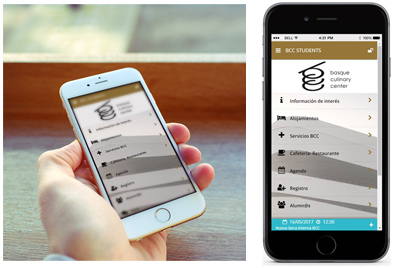
During their study years, BCC students will have access to the BCC Student APP. Through this APP students will be informed about grants and scholarships, job opportunities, extracurricular learning opportunities, events, invitations to exclusive Master Classes... They will also be informed on student discounts, BCC Cafeteria or Restaurant reservations, transportation, etc.
BCulinary Alumni
You can access all the information in the following link.

